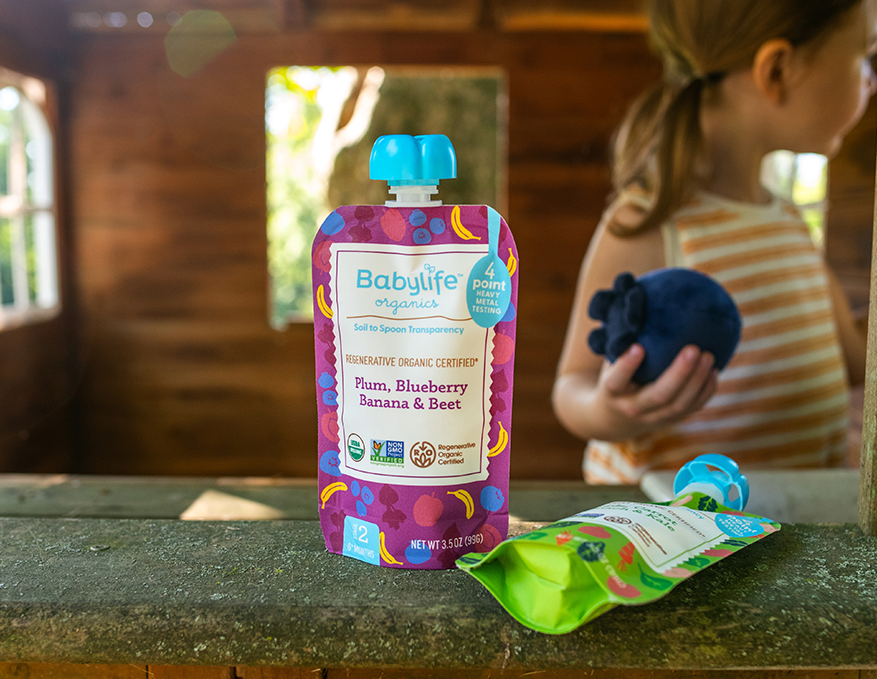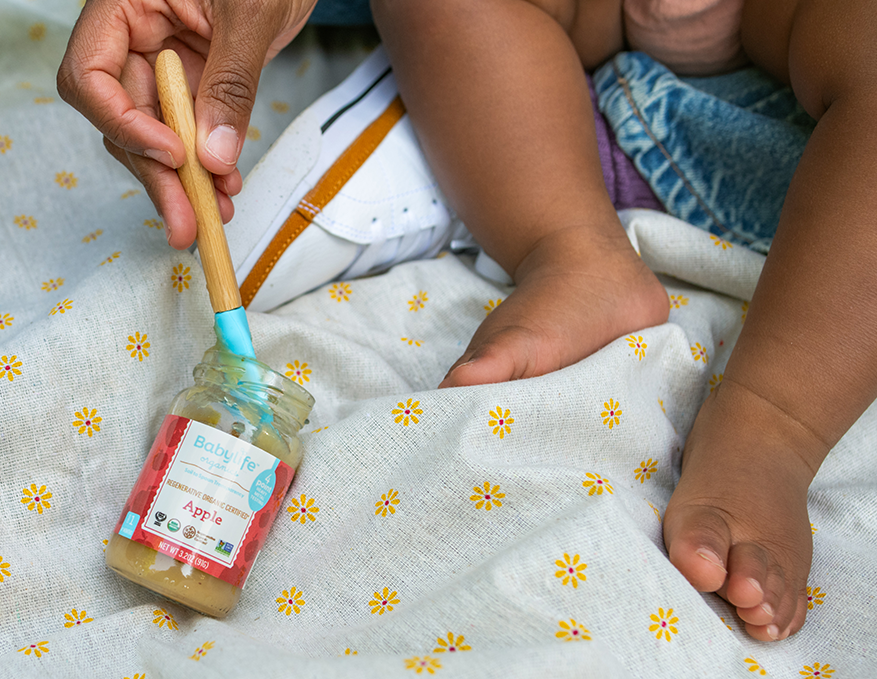Babylife FAQs
1. What makes Babylife products different?
We are the only baby food brand to independently test every batch for heavy metal safety at four stages of production — soil, raw ingredients, prepared ingredients, finished product – and to publish the testing results for any parent or caregiver to review. We are also the first baby food brand that is Regenerative Organic Certified®.
2. Where can I buy your products?
Our stage 1 jars and stage 2 pouches are available nationwide at Whole Foods Market. You can also shop here on our site.
3. Are your products organic and non-GMO?
Yes. All of our products are USDA Certified Organic and Non-GMO Project Verified.
We’ve also gone a step (or several steps) beyond those standards to receive Regenerative Organic Certification® – meaning we use practices that promote the health and safety of the soil, crops, and farming community.
4. What are heavy metals, and how do you test for them?
When we say heavy metals, we’re talking about the “big four”: arsenic, cadmium, lead, and mercury. Because heavy metals are found naturally in soil and water across the globe, they are essentially unavoidable. There are, however, some regions of the world with lower levels of naturally occurring heavy metals.
After searching far and wide, our founders chose to source all ingredients exclusively from Regenerative Organic Certified® farmland and wild-harvested groves in Türkiye.
Using an accredited third-party lab, we test heavy metal levels at four stages of production: soil, raw ingredients, prepared ingredients, and finished goods. As a final step, we publish the finished goods test results on our website where you can easily find them.
5. Why do I not see a USFDA standard for safe levels of heavy metals in baby food anywhere?
The short answer is this: Even though there has been tremendous pressure from advocates and parents like you for over six years, the US Food and Drug Administration still has not mandated a safety standard for heavy metals in baby food.
We couldn’t wait any longer. After several years spent educating ourselves on this important topic, we now look to the limits (also called “tolerance levels”) set by respected third-party organizations and other governing bodies like the European Union.
6. When should I transition my baby to solid foods?
That’s up to you and your baby! Your pediatrician is a great resource for more advice.
We can say that, generally, most babies start solids around five or six months.
7. How much should my baby eat each day?
That varies by baby and will depend on their age, size and how much breast milk or formula they are consuming Your pediatrician is a great resource for more info on feeding and nutrition.
8. Where do ingredients for Babylife Organics products come from?
Our fruit and vegetables are grown on Regenerative Organic Certified® land and wild-harvested groves in Türkiye (Turkey).
9. What are your return and refund policies?
We cannot do returns, but we absolutely do refunds. If you’re not happy with a product or
order for any reason, please let us know within 45 days and we’ll make it right. The best
place to get in touch is on our contact page.
10. Are your products pasteurized?
Our jars and our pouches are fully pasteurized during our production process.
11. What does PPB mean?
Parts per billion (ppb) is a unit of measurement used to specify the concentration of a contaminant in soil or sediment. “1 ppb” would signify that there is one unit of a contaminant per one billion parts of the whole.
12. How do you test for heavy metal levels?
We work with an independent testing organization that can test down to among the lowest levels in the industry – 2 ppb. Any amount below 2 ppb delivers a NOT DETECTED result. (Many labs use less sensitive equipment and, therefore, cannot test down to levels as low as 2 ppb.)
We test for heavy metal levels at four critical stages: The first is the soil, tested once a year or during each planting season. The next step is testing raw ingredients from each harvest lot code, followed by prepared ingredients. Finally, we test the finished, packaged product.
Because we uniquely test at four stages, we can easily identify any problems much earlier in the supply chain (e.g. the soil) so we can mitigate any issues before moving into production.
13. How did you find your farms?
We have been working in the organic food industry for decades. Most companies need to source their ingredients from multiple farms because it is hard to source fruits and vegetables from the same place. As we set out to solve this problem, we reached out to a trusted farming and manufacturing partner in Türkiye (Turkey).
Our farming partner is incredibly unique in that they cultivate a broad assortment of fruits and vegetables. The farm itself is also mostly untouched by modernization – in fact, many of our fruits are grown in wild-harvested orchards.
Why commercial farms? Our founding team has decades of experience sourcing USDA Certified Organic produce and using it to craft safer, cleaner foods. In that time, we’ve come to realize a simple truth – it’s not the scale of the farm that matters, it’s the standards.
We exclusively work with a commercial farming partner that prioritizes the health and safety of the soil, the farmers, and the ecosystems their farming affects.
A small, local farm here in the US may have the best of intentions; unfortunately, it may also be located in a region with higher levels of heavy metals. Meanwhile, the soil in Türkiye (Turkey) where we farm is some of the safest on Earth. Generations of naturally regenerative, non-industrial agricultural practices have maintained the health and integrity of the land.
14. Why do you source your ingredients from so far away?
Türkiye (Turkey) offers some of the cleanest, purest soil on Earth; much of their farming land is virtually untouched by modern industrial practices. In fact, our partner is still clearing untouched, uncultivated land to use for regenerative organic farming.
15. How do I know if my product is damaged?
Like all products, occasional dings and damage can happen to products as they make their way to the shelf. To be safe, we recommend that you never feed your baby from a baby food jar with a dented lid or a lid that does not “pop” when you first open it. If a pouch appears bloated or the lid is not sealed, please do not use it. You can return those items to your local store or contact us at hello@babylifeorganics.com and we’ll make it right.
16. Are your products allergen-friendly?
Babylife products are allergen friendly for the top 9: milk, eggs, fish, shellfish, tree nuts, peanuts, wheat, soybeans, and sesame.
17. Is there any ascorbic acid or lemon juice concentrate in your baby food?
All Stage 1 jars have no ascorbic acid or lemon juice concentrate. — just the Regenerative Organic Certified vegetable or fruit! Our Stage 2 pouches contain a small amount of lemon juice.


